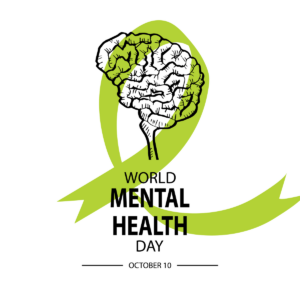October 10 is World Mental Health Day
By Gretchen Vannice, MS, RDN
World Mental Health Day occurs annually on October 10. This year the theme is mental health care for all: let’s make it a reality. It’s a great time to take a few minutes to review our investment in mental health. Do you know the integral role of nutrition in mental health?

Let’s start with you! How are you doing? Are your diet and lifestyle choices helping or hindering your mental health? We easily forget that the brain depends on the nutrients we consume to fuel and supply development in childhood and performance and maintenance in adulthood. The brain comprises only 2% of our body size, but it uses 20% of our energy supply. Just like our heart, bones, and other vital organs, our brains need care and feeding! Yes, sleep, exercise, and other lifestyle factors influence mental health, but the topic today is nutrition.
If you work in the omega-3 business, you are in a great position to share the good word on nutrition and mental health. Why? Because EPA and DHA omega-3s are required nutrients for human brain development and lifelong function. Remember, EPA and DHA omega-3 are essential fats because we need them and our bodies can not produce them.
Let’s look at depression, the most common mental health condition around the world. From the more than 100 clinical trials on omega-3 and depression, we know the need for and benefit of omega-3 is great.
Some quick facts on Depression:
- It is the leading cause of disability, worldwide
- It affects more women than men
- Serious barriers to seeking treatment exist, including shame and social stigma
- It is a combination of biological, social, and psychological factors
- It is interrelated with other chronic conditions and can worsen outcomes
Some quick research facts about Depression and Omega-3s
- Research shows that people with depression have low levels of omega-3s
- Depression is less common in cultures where fish is regularly consumed
- DHA omega-3 is a physical, structural component of brain cells
- EPA and DHA are fat-based nutrients; it takes 8-10 weeks for tissue levels to change
- Eating more processed foods increases our need for EPA and DHA omega-3
- Vegetarians and vegans have a unique need for EPA and DHA omega-3
- It’s unclear if the reported benefits of EPA and DHA omega-3 on depression are mechanistic, or addressing nutrient deficiency, or both
- Getting enough EPA and DHA omega-3 to make a difference is crucial
- Both the International Society of Nutritional Psychiatry Research and The American Psychiatric Association recommend EPA and DHA omega-3s for depression and related mental health conditions.
The International Society of Nutritional Psychiatry Research recommends EPA and DHA omega-3 for depression
The International Society of Nutritional Psychiatry Research (ISNPR) organization was recently founded to bring together experts in psychiatry and nutrition science.
General ISNPR recommendations: Daily intake of 1-2 grams of both EPA and DHA, in a ratio of at least twice as much EPA than DHA. This includes pregnant women, children, and the elderly. Always work with your healthcare provider.
The American Psychiatric Association recommends fish and fish oil for mental health
After reviewing the research, the American Psychiatric Association (APA) concluded there is a beneficial role for omega-3s – specifically for EPA and DHA omega-3 – in mood and mental health. Plus, given the other nutrition and health benefits of EPA and DHA omega-3s, such as heart and circulatory health and metabolism, they noted that EPA and DHA omega-3 may be of particular importance for people with mental health challenges, in part because depression, meal planning and better food choices don’t typically occur together.
APA recommendations:
- All Adults eat oily fish two or more times per week
- Adults with mood, impulse control, or psychotic disorders consume 1,000 mg EPA and DHA per day
- Adults with mood disorders may supplement with 1,000 to 9,000 mg EPA and DHA per day (and work with their doctor if taking more than 3,000 mg EPA and DHA per day)
 In honor of World Mental Health Day, all of us can invest in mental health
In honor of World Mental Health Day, all of us can invest in mental health
What we eat directly influences our mood, behavior, and mental health today and in the future. What we feed our family influences their mood, behavior, and mental health today and in the future. As dependents, children rely on us to make choices for their future through the food we feed them.
All of us have a role to play in World Mental Health Day! Whether it’s your choice for dinner tonight, telling your neighbor what you just learned about omega-3s, buying fish oil for the first time, or if you are purchasing bulk fish oil to put in a supplement or formulating a new sports bar with omega-3 powder, each of these steps are a real investment in world mental health.
Gretchen Vannice is the Director of Nutrition Education and Research for Wiley Companies. She is a globally recognized expert, author, and speaker in omega-3 research and education.
Disclaimer: This information is offered for educational purposes only. It is the opinion and scientific interpretation of the author. It is not intended as medical advice of any kind. The educational information provided is not intended to diagnose, treat, mitigate, or cure any disease nor has this been reviewed or approved by the FDA.
Scientific References are available upon request.